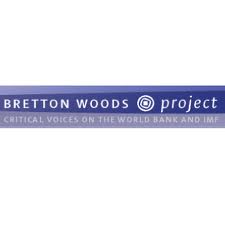World Bank’s ‘green growth’ approach denounced (Bretton Woods Project)
Bretton Woods Project / July 2012
 This article looks at civil society voices that criticise the ‘green growth’ and ‘green economy’ agenda being promoted by the World Bank.
This article looks at civil society voices that criticise the ‘green growth’ and ‘green economy’ agenda being promoted by the World Bank.
Read article
In the May 2012 report Inclusive Green Growth the World Bank defined green growth as “growth that is efficient in its use of natural resources, clean in that it minimizes pollution and environmental impacts, and resilient in that it accounts for natural hazards and the role of environmental management and natural capital in preventing physical disasters. And this growth needs to be inclusive”.
The concept of natural capital is at the heart of this proposal. This would place a monetary value on nature in order for it to be fully recognised in national accounts alongside conventional measure of GDP.
Criticisms of the World Bank approach include:
- It does not address the drivers of the environmental crisis which is a result of economic growth based on extractives
- The concept of natural capital will lead to the privatization of nature
- Disproportionate focus on the role of the private sector
- Insufficient attention given to socially inclusive growth
- Lack of transparency around ‘fund of funds’ proposal to promote clean energy and energy efficiency
- New cycle of debt for “green” projects
At Rio+20 the World Bank backed several key initiatives including the programme on Wealth Accounting and Valuation of Ecosystem Services (WAVES) and the Natural Capital Declaration.
Read article
See also: Nature on the market? The World Bank at Rio+20 (Bretton Woods Project / April 2012)
————————————
This summary was prepared by Why Green Economy?. The views expressed have been paraphrased. See the original source for more information.

Leave a Reply